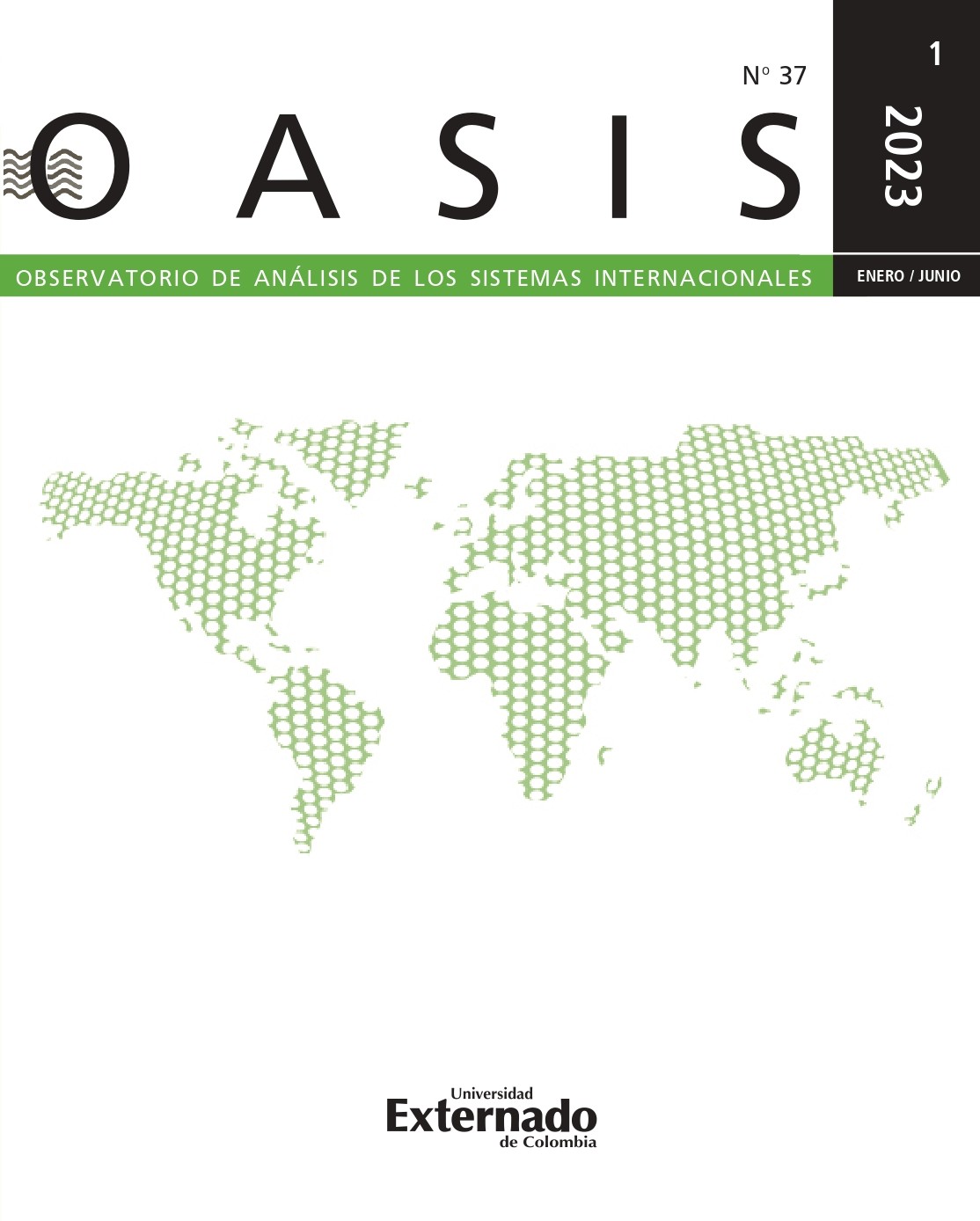Small islands in international relations scholarship: A dialectic centrality
Small islands in international relations scholarship: A dialectic centrality
Contenido principal del artículo
Resumen
En la erudición de las relaciones internacionales (RI), las islas rara vez se consideran, excepto en contextos específicos, y esos contextos rara vez involucran dimensiones que convencionalmente se consideran importantes. La mayoría de las islas, ya sean soberanas, semiautónomas o completamente no autónomas, están relegadas a los márgenes de la erudición de las RI. Este artículo desafía la validez de esta marginación al presentar y examinar islas autónomas tanto soberanas como no soberanas como actores internacionales. Estos ejemplos ilustran la gran paradoja de las islas, a saber, que a lo largo de la historia estas han funcionado como puntos centrales en lugar de ideas secundarias y, debido a ese papel central, las islas encarnan la síntesis de la cultura y la política que constituyen nuevas identidades. Las islas artificiales aportan una mayor complejidad pasada por alto al ejercer una autonomía libre de soberanía. Finalmente, las islas, especialmente los países insulares pequeños, refuerzan y desafían las teorías estándar de relaciones internacionales al ser a la vez autónomos y por necesidad integrados en la globalización. Todas estas características constituyen una centralidad dialéctica, en la que las islas, autosuficientes pero marginadas, juegan un papel central en las relaciones internacionales. Este artículo trae estos territorios colectivamente al frente, con el fin de ilustrar su importancia actualmente subestimada en la disciplina de RI como actores globales.
Descargas
Detalles del artículo
Referencias / Ver
Aljazeera (2020, September 14). Which Countries Have Not Reported Any Coronavirus Cases? Aljazeera, https://www.aljazeera.com/news/2020/09/14/which-countries-have-not-reported-any-coronavirus-cases/
Allen, B. W. (2017). The Great Siege of Malta: The Epic Battle between the Ottoman Empire and the Knights of St. John. Fore Edge.
Baldacchino, G. and Wivel, A. (2020). Handbook on the Politics of Small States. Edward Elgar Publishing.
Boswell, R. (2006). Le Malaise Creole: Ethnic Identity in Mauritius. Berghahn Books.
Bradford, E. (1999). The Great Siege: Malta 1565. Wordsworth edition.
Briffa, H. (2020). Can Small States Have a Grand Strategy? (Ph.D. Thesis), King’s College, London.
Briffa, H. (2018). Malta: Bridge of the Mediterranean: Neutrality as a Small State, States Seeking Grand Strategy. Small States and the New Security Environment Policy Brief, presented at the conference “Small States and the New Security Environment,” Nordic House, Reykjavik, Iceland, June 26, 2018.
Corbett, J. and Veendaal, W. (2018). Democracy in Small States: Persisting Against All Odds. Oxford University Press.
Corbett, J., Veenendaal, W., and Ugyel, L. (2017). Why Monarchy Persists in Small States: The Cases of Tonga, Bhutan, and Liechtenstein. Democratization 24 (4), 689-706.
Duursma, J. C. (1996). Fragmentation and the International Relations of Micro-states: Self-Determination and Statehood. Cambridge University Press.
Eccardt, T. (2005). Secrets of the Seven Smallest States of Europe. Hippocrene Books.
Falola, T., Parrott, R. J. and Porter Sanchez, D. (Eds.) (2019). African Islands: Leading Edges of Empire and Globalization. University of Rochester Press.
Gonzales, A. P., et al. (2022). Caribbean Citizenshipby- Investment Programmes: Performance and Challenges. Caribbean Investigative Journalism Network. Clermont, FL, May 22, 2022.
Hand, F. (2011). Lindsey Collen: The Courage to Be Parochial. Wasafari, 26, 2.
Haring, L. (2007). Stars and Keys: Foktales and Creoliza¬tion in the Indian Ocean, trans. Claudie Ricaud and Dawood Auleear. Indiana University Press.
Hawkins, P. (2007). The Other Hybrid Archipelago: In¬troduction to the Literatures and Cultures of the Francophone Indian Ocean. Lexington Books.
Hawkins, P. (2008). Until When Shall We Remain Postcolonial? Globalization, Nationalism, and Cultural Self-Determination in the Literatures of the Indian Ocean. E-France: An On-Line Journal of French Studies, 2, 8-18.
Hey, J. (2003). Small States in World Politics: Explaining Foreign Policy Behavior. Lynne Rienner.
Ingegritsen, C., Neumann, I., Gstöhl, S., and Beyer, J. (Eds.) (2006). Small States in International Relations. University of Washington. Press and University of Iceland Press.
Klieger, P. C. (2011). The Microstates of Europe: Designer Nations in a Post-Modern World. Lexington Books.
Krasner, S. D. (1999). Sovereignty: Organized Hypocrisy. Princeton University Press.
Lobban, R. A. (2018). Cape Verde: Crioulo Colony to Independent Nation. Routledge.
Koryogroup (2020). Are There Countries without Coronavirus? https://koryogroup.com/blog/are-there-countries-without-coronavirus, September 20, 2020.
Murray, A. SM (2016) Thinking about Political Things: An Aristotelian Approach to Pacific Life. AFT Press.
Pace, R. (2002). A Small State and the European Union: Malta’s EU Accession Experience. South European Society and Politics, 7 (1), 24-42.
Rothman, T (2007). The Great Siege of Malta. History Today, January.
Smith, R. (2008). Cyber-states and the ‘Sovereignty’ of Virtual Communities, in E. Kaufman, E. and G. Youngs (Eds.). Globalization: Theory and Practice. (3 ed., pp. 265-276). Continuum International Publishing Group.
Taylor-Lehman, D. (2020). Sealand. Division Books.
Toussaint, A. (1966). History of the Indian Ocean. Routledge.
Verges, F. (2001). Vertigo and Emancipation, Creole Cosmopolitanism and Cultural Politics. Theory, Culture & Society, 18 (2-3), 169-183.
Wright, N. E. (2021). Central Margins: Paradox and Transformation of Dichotomies in Two English Language Novels by Mauritian Lindsey Collen. Journal of Indian Ocean World Studies, 5 (1), 93-113.
Wright, N. E. (2020). Small States and International Relations Pedagogy: Exploring the Creative Agency Frontier. OASIS, 32, 49-62.










